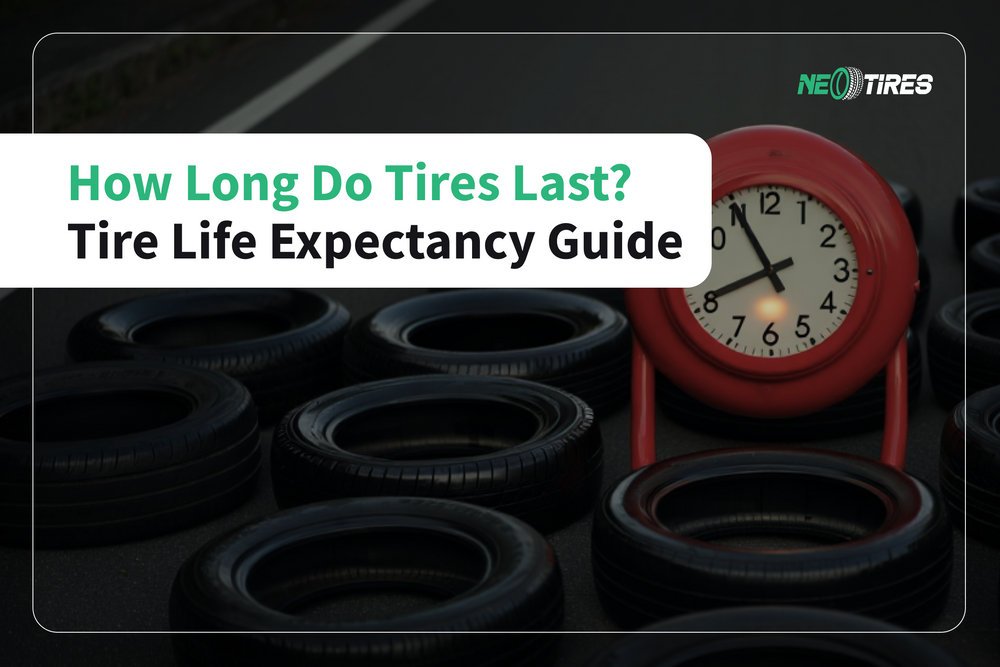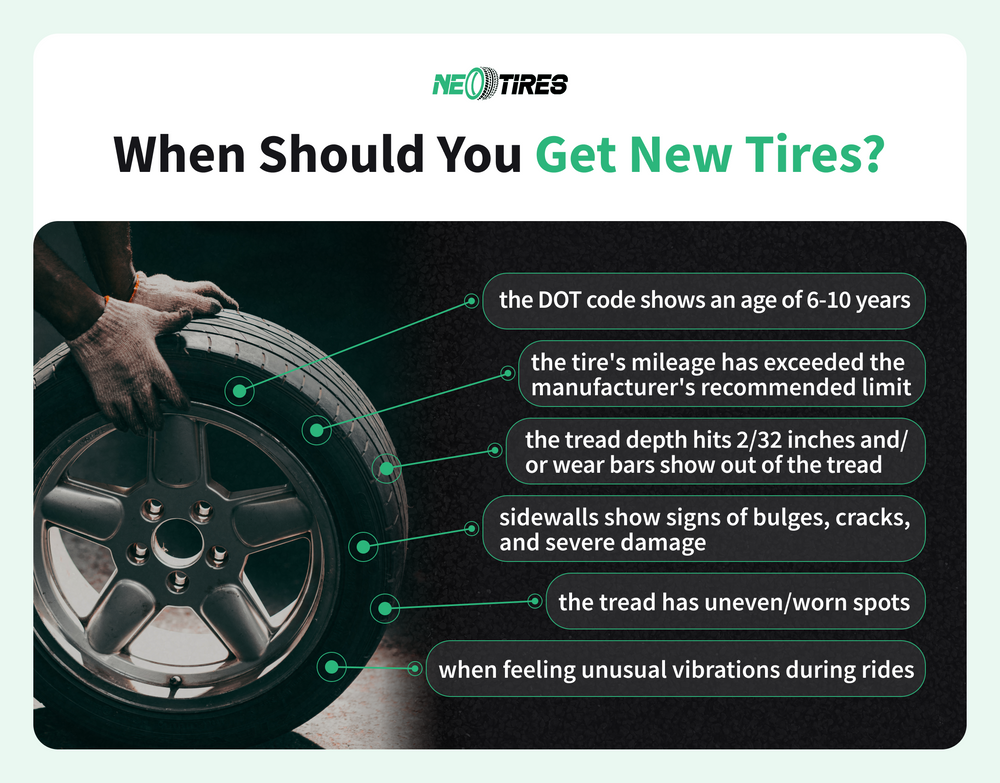Tire health and durability are essential aspects of safe and performant driving. How long should tires last? - is a common concern for many drivers because everyone wants their tires to be a long-lasting investment. Tire life expectancy actually depends on a combination of factors more than the warranty the manufacturer provides. Stay along to learn essential insights on average tire life and when to change your tires.
How Long Do Car Tires Last on Average?
As per NHTSA, Michelin, and Bridgestone, tires' maximum serviceability should not exceed 6-10 years. They wear out constantly while on the road and, after 6-10 years, are no longer safe to use, regardless of how deep the tread is. However, actual tire life varies depending on usage (driving habits, road/weather conditions, maintenance, tire type, mileage).
How Long Do Tires Serve in Years
Depending on their type, tires last between 3 and 10 years. The life expectancy of all-season products is between 5 and 7 years; performance tires deliver around 3 to 5 years, and winter alternatives are viable within 3 to 5 years as well. Off-road and truck tires are usually the most long-lasting due to reinforced carcasses and multiple plies ensuring their durability. Their life is 4 to 6 years for off-road options and between 6 to 10 years for truck models.
How Many Miles Can Tires Last?
Tire mileage ranges from 20,000 to 100,000 miles, depending on its type and the stresses it is exposed to during its life. Manufacturers generally estimate the life of all-season tires to be between 50,000 and 80,000 miles.
Winter and performance car tires last around 20,000-40,000 and 30,000-50,000 miles, respectively. Off-road options are good to go within 30,000-60,000 miles, while truck wheels can serve up to 50,000-100,000 miles.
However, these are just general estimates; the actual tire mileage is determined by how the tire is used, the car owner's driving style, and how he maintains his tires throughout tire service life.
| Tire Type | Average Life Expectancy (Miles) | Average Life Expectancy (Years) |
| All-Season | 50,000 – 80,000 miles | 5 – 7 years |
| Performance | 30,000 – 50,000 miles | 3 – 5 years |
| Winter | 20,000 – 40,000 miles | 3 – 5 years |
| Off-Road | 30,000 – 60,000 miles | 4 – 6 years |
| Truck | 50,000 – 100,000 miles | 6 – 10 years |
Tire average life expectancy based on tire type
How Long Do Tires Last With Low Mileage?
Regardless of how much you drive per month or year, your tire usage should not exceed 6-10 years. Tires tend to degrade over time, even if driven occasionally. Keep in mind that tires can age out before wearing out. Aged rubber impacts driving safety and performance due to cracks and fissures leading to tread separation. We recommend changing your tires every 6-10 years, even if you don't drive often and the tread seems deep and even. Check the age of your tires by reading the DOT code on their sidewall.
Extra Load Impact On Tire Service Life
Constant extra load on tires leads to shorter mileage, regardless of the manufacturer's guaranteed life expectancy. For example, all-season tires on an overloaded sedan will last 10,000-20,000 miles less due to faster wear. Overloaded SUV tires will likely provide 30% less mileage due to extra stress and early wear.
Extra weight, especially when constant, causes the tread to wear faster due to additional stress and heat build-up. In addition, you will experience additional adverse effects, such as higher rolling resistance (lower fuel efficiency) and possible sidewall damage.
The best practice for contributing to tire longevity is to respect its weight capacity as defined by the tire load rating. Alternatively, choose tires with a higher load index to support heavy-duty tasks.
Tire Brands and Estimated Tire Lifespans
The tire service life depends significantly on the manufacturer's technologies, rubber formulas, and the strategic design to reduce wear. For this reason, tires of the same type can last differently, even if used in the same conditions. Below, you will find some models of the longest-lasting tires:
| Brand | Model | Type | ≈ Lifespan |
| Michelin | Defender T+H | All-Season, Passenger, SUV/CUV, Touring | 80,000 miles |
| Bridgestone | Turanza QuietTrack | All-Season, Passenger, SUV/CUV, Touring | 80,000 miles |
| Goodyear | Assurance MaxLife | All-Season, Passenger, SUV/CUV, Touring | 85,000 miles |
| Pirelli | P4 Four Seasons Plus | All-Season, Passenger, SUV/CUV, Premium | 90,000 miles |
| Continental | TrueContact Tour | All-Season, Passenger, SUV/CUV, Touring, LT | 80,000 miles |
| Cooper | CS5 Grand Touring (T) | All-Season, Passenger, SUV/CUV, Touring | 80,000 miles |
Tires with the longest mileage
When Should You Get New Tires?
Tire mileage and age are key elements to tell when it's time for tire replacement. But they're not the only ones. The actual tire condition is an equally important aspect that tells you when a replacement is necessary, even if the tire has low mileage and is not aged.
The roads you roll on, the style you drive, and the load your car carries affect tire tread life and can hasten the need for tire replacement. So, apart from counting miles, also check the following signs to make the switch on time:
When to replace a tire: General Guidelines
- the DOT code shows an age of 6-10 years;
- the tire's mileage has exceeded the manufacturer's recommended limit;
When to replace a tire: Additional Recommendations
-when the tread depth hits 2/32 inches and/or wear bars show out of the tread. Check the Tire Tread Depth Chart to know if your tires are still safe.
- when sidewalls show signs of bulges, cracks, and severe damage; Learn more on Why Bulges Appear And What To Do
-when the tread has uneven/worn spots (outer wear/inner wear/ cupping/feathering);
- when feeling unusual vibrations during rides.
Final Thoughts
How long your vehicle tires last cannot be determined with any certainty. While manufacturers do provide tread life expectations, actual tire service depends on multiple factors: the way you drive, how you maintain them, and the road and weather conditions you primarily drive in.
One thing is sure: you can maximize car tire service life by regular maintenance (alignment, rotation, pressure adjustment, balance) and by following manufacturer recommendations (not exceeding load and speed ratings, adopting judicious driving habits). Also, replacing tires when reaching 6-10 years is a safe practice, no matter how "healthy" the tire seems.
Need New Tires For Replacement?
If your car tires have reached their age and mileage potential or are showing signs of damage, it's time to replace them. The NeoTires catalog offers a wide range of reliable products at affordable prices.
Talk to us if you're not sure what's right for you! Our trained assistants will find the proper set to match your needs, budget, and tire life expectancy. Drive safe and choose your tires wisely!







